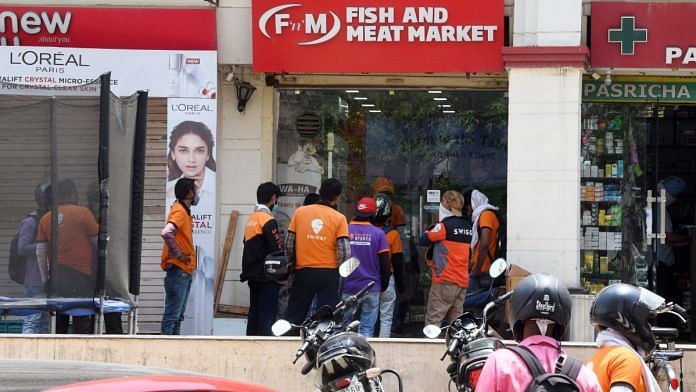New Delhi: Caste disparity is as much a part of the gig economy in India as long work hours and poor pay. Around 63 percent of cab drivers from the Scheduled Caste (SC) and Scheduled Tribe (ST) communities work more than 14 hours a day, while only 16 percent of app-based drivers from the unreserved category work such long hours.
These were some of the key findings of a national survey of more than 10,000 gig workers — cab drivers and delivery persons on apps — across eight cities, including Delhi, Lucknow, Mumbai, Bengaluru, and Hyderabad.
Moreover, 43 percent of cab drivers earn less than Rs 15,000 a month, while 34 percent of delivery persons earn under Rs 10,000 a month.
The report, ‘Prisoners on Wheels?’, was brought out Monday by the People’s Association in Grassroots Action and Movements (PAIGAM) and the Indian Federation of App-based Transport Workers (IFAT), with support from the University of Pennsylvania in the United States and the Friedrich-Ebert-Stiftung India, a non-profit German foundation.
Highlighting the need to treat gig and platform workers as employees, the authors recommended giving them daily assured earnings equivalent to the state minimum wage, insurance, and security benefits, apart from putting a cap on their working hours and the mandatory registration of the workers in government records.
The authors also stressed on the importance of the apps functioning transparently in terms of algorithms, incentive systems, and payment mechanisms.
The survey for the report spanned two years. “We needed such long research because all these big companies — Zomato, Swiggy, Ola, Uber — do all their work digitally but never share their data. If these companies shared their data, this kind of research would never need to be done,” Professor Biju Mathew, the report’s principal investigator, said, joining a press conference in Delhi’s Constitution Club of India from New York via video conferencing.
This is the largest research report on working and living conditions of gig workers, Mathew, an associate professor at Rider University in New Jersey, added.
Around 80 percent of cab drivers said they did not find the current fares satisfactory, while among delivery executives, it was 73 percent.
There’s also the fear of violence — 47.1 percent of cab drivers questioned for the survey said they faced “some form of violence” at work. For delivery persons, 41.5 percent responded in a similar vein.
“By using facts and numbers of this report, we can now take the legal fight for our rights further in front of the court and the government,” said Shaik Salauddin, the national general secretary of IFAT, the trade union federation of ride-sharing and other gig transport workers.
Also read: Gig dream is fading for Uber, Ola drivers. They are forming picket lines & support groups
Long work hours
The long work hours were one of the key findings of the study. More than half of the cab drivers (67 percent) and delivery persons (65 percent) said they spent negligible time with family.
When it came to taking a single day off in a week, 41 percent of drivers surveyed said they were not able to do so. Among delivery persons, it was 48 percent.
‘Gig worker’ refers to a person who works temporarily in the service sector as an independent contractor or freelancer. But panellists at the Constitution Club of India and drivers and delivery persons in the audience had a problem with this term, ‘gig’. They pointed out that despite working more than 10 hours a day, drivers and delivery persons cannot get full-time employee status or job security. They should be called ‘app-based or platform-based workers instead, the report said.
The report’s authors interviewed 5,308 cab drivers and 5,028 delivery personnel for the survey. Among the drivers, 83 percent said they worked more than 10 hours a day. Among delivery persons, it was 78 percent.
Almost all the drivers (99.3 percent) interviewed suffered from health issues like joint pain and back aches, while 98.5 percent of drivers admitted to suffering from depression, anxiety, and stress.
Also read: Govt can’t make gig workers’ welfare all about social security. Choice, flexibility are key
ID blocking
Sudden ID blocking, where only one complaint of the customer or the company can deactivate the ID of any worker at any time, is another big problem.
“More than 83 percent of drivers report issues of ID blocking, and 87 percent of delivery persons are affected negatively because of ID deactivation,” according to the report.
“It’s an industry that has long been marginalised and exploited because of the way gig companies hide their data and not simply their terms and conditions from a worker,” said Mathew.
(Edited by Madhurita Goswami)



